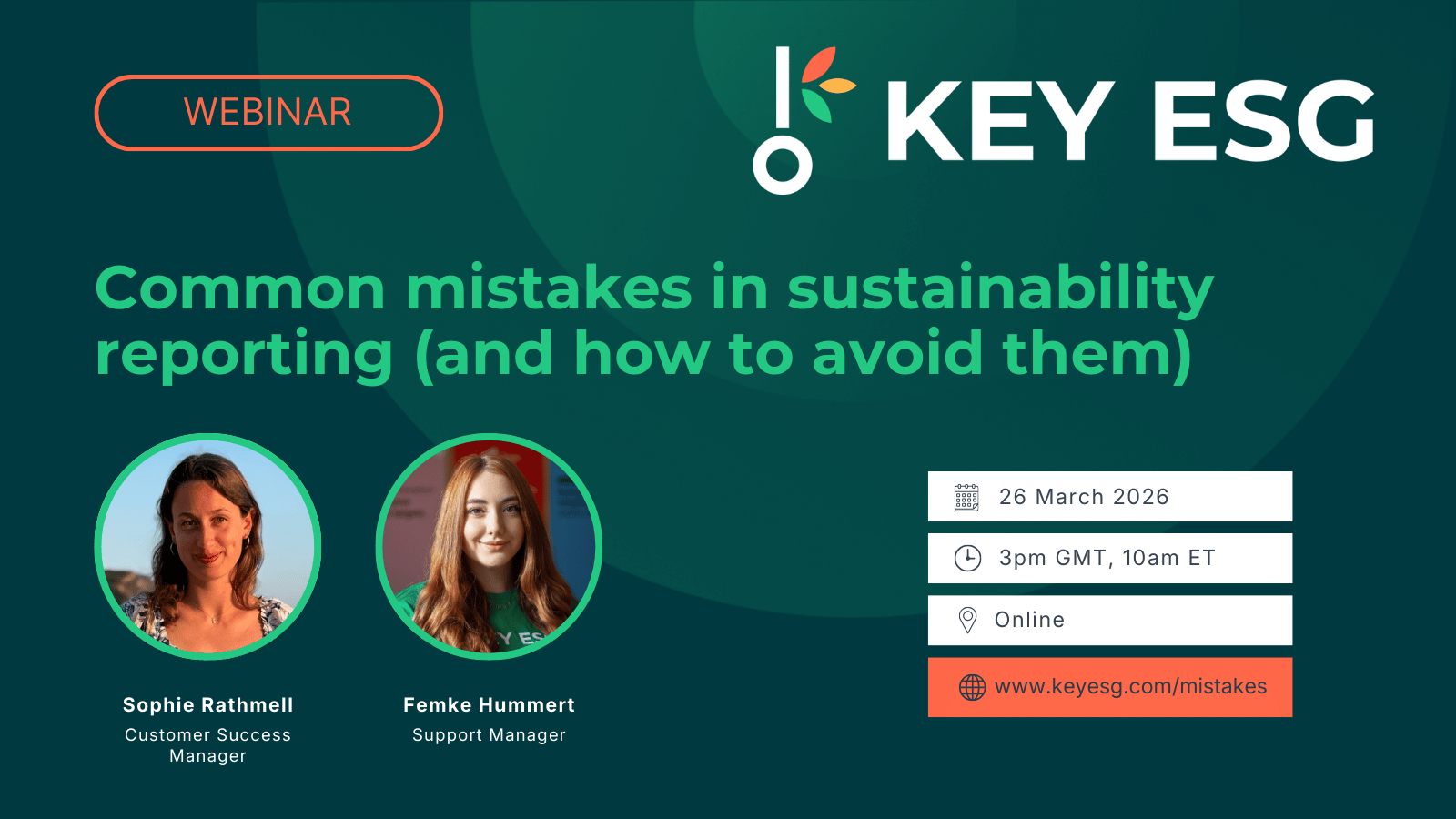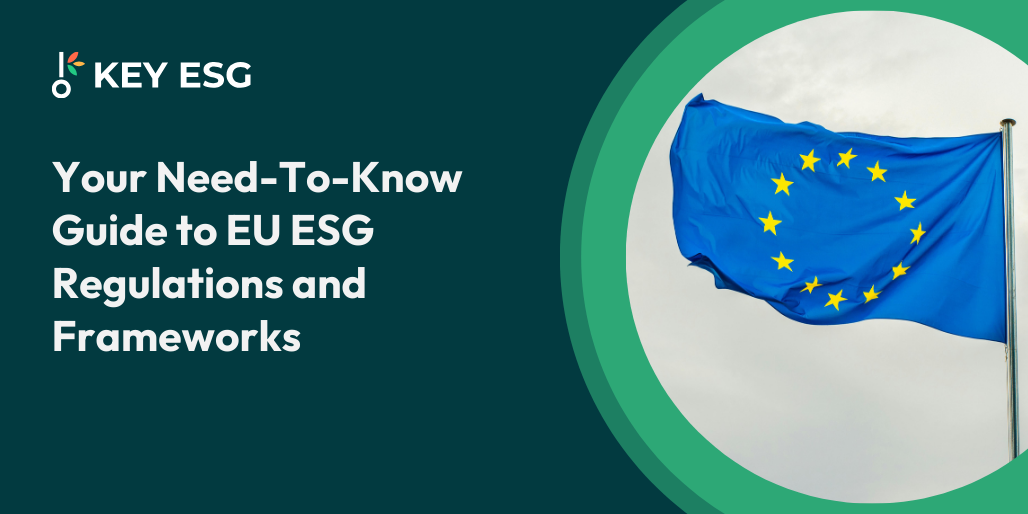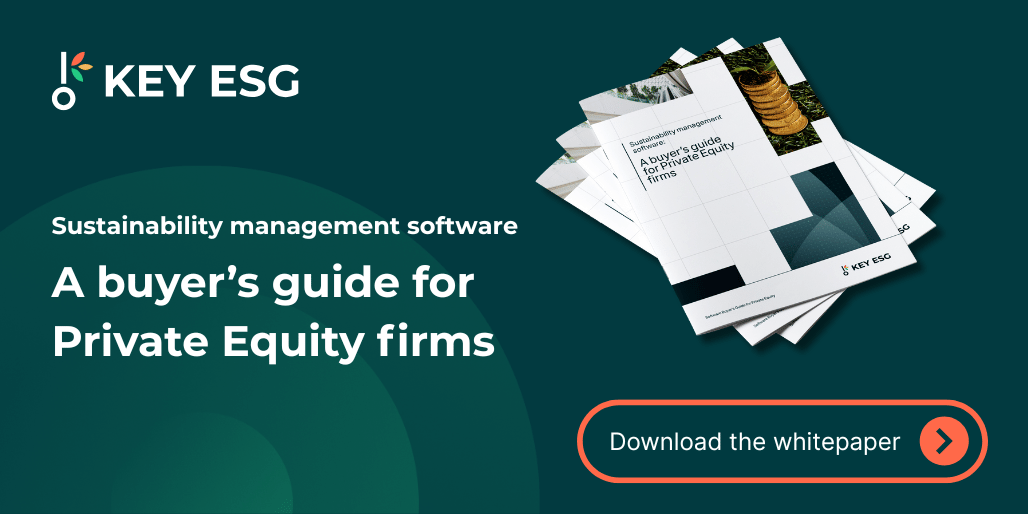Carbon Accounting: A Practical Approach for Fund Managers
On October 12th 2022, KEY ESG held a webinar on carbon footprint and carbon accounting for fund manager. Private equity firms and venture capitalists are dealing with an increasing number of regulations on greenhouse gas emission (GHG) and emission reduction. It can be hard to keep up!
We put together a panel to discuss the latest updates in carbon accounting regulation, and what these will mean for asset managers going forwards.
The panel
Our panel was chaired by KEY ESG's very own CEO, Heleen van Poecke. ESG Analyst Harry Llewellyn gave a presentation on carbon accounting regulations, and then the debate was opened up to all panel members. External panel members included:
- Alison Collins, Head of ESG at Pollen Street Capital. Pollen Street Capital is a mid-market asset manager based in London. The company specialises in private equity in financial services and credit. Alison has been working on environmental, social, and governance (ESG) regulations for 3 years.
- Valerio Magliulo, Co-founder at Abatable. Abatable is a carbon procurement platform that allows corporates to connect with supply chain carbon project developers. Abatable's solution helps businesses to source carbon credits, enabling them to achieve carbon neutrality and net zero goals.
Carbon accounting: Setting the Scene
Harry Llewellyn opened the webinar by providing some background context on carbon accounting on a global scale. ESG regulators around the world either already have or will soon be imposing new regulations on carbon accounting.
SFDR
In Europe, the Sustainable Finance Disclosure Regulation (SFDR) seeks to reduce consumption and eliminate greenwashing. The next SFDR principal adverse impacts (PAI) report is due in June 2023, and it involves Scope 1 to 3 emissions. The SFDR represents a broader turning point in the private equity world. It is the first time fund managers have been required to disclose detailed quantitative data on their portfolios.
TCFD
The Task Force on Climate-related Financial Disclosures (TCFD) is a UK-specific regulation involving emissions disclosures for public companies. This legislation will apply to fund managers managing >£50bn next year. One year later, funds of >£5bn will be included as standard.
US SEC
The US Securities and Exchange Commission (US SEC) will require disclosures from companies with a public float of >$700m. Like the TCFD, other publicly listed companies will join the list at a later date. These regulations, however, are largely focused on setting targets, and they have an additional requirement involving third party verification.
UK SDR
The Sustainability Disclosure Requirements (UK SDR) is the UK's post-Brexit response to the SFDR. It requires asset managers to disclose how they're managing funds. Like the TCFD and the US SEC, the amount of fund managers this impacts will become more inclusive over the next few years. The timelines, however, are less clear.
EU CSRD
The EU Corporate Sustainability Reporting Directive (EU CSRD) is the non-financial counterpart to the SFDR. It also involves Scope 1 to 3 disclosures. Large companies will need to adhere to guidelines from 2025 onwards. A wider group of companies will then need to report by the following year.
It is worth noting that the above dates are the dates that the disclosures are due. The data disclosed will pertain to the preceding year, so it's important that asset managers start recording data now in order to comply.
All ESG regulations will require carbon accounting
- All ESG regulations require reporting on at least Scope 1 and 2, and often Scope 3 emissions.
- Scope 3 disclosures usually follow Scopes 1 and 2.
- The regulation of larger entities signals what is to come for smaller entities.
What are Scopes 1 to 3?
Scopes 1 to 3 involve different ways companies can categorise emissions. By measuring in 3 scopes, firms can identify the carbon emitted based on everything the company does to operate.
Scope 1 = carbon from fuel that companies burn or use directly. This includes fuel for vehicles or energy generation at company facilities.
Scope 2 = the indirect emissions arising as a result of fuel that a company buys. This includes purchased electricity, heating, and cooling.
Scope 3 = the indirect emissions associated with everything else involved in a company's operation. Scope 3 is divided into 15 categories - 8 upstream activities and 7 downstream activities. See the webinar recording to learn more.
Carbon accounting methodologies
There are several ways to measure carbon accounting, and not all methodologies are accepted by regulators. The high-level proxy method, for instance, is generally not accepted, as it is based on average calculations.
Other options, such as the spend-based method, the activity-based method, and the direct/supplier method, are all accepted. The direct/supplier method is considered the most accurate. The more accurate a measurement technique, the easier it is for companies to identify hotspots.
KEY ESG only caters to the accepted carbon accounting measurement techniques (spend-based, activity-based, and direct/supplier methods) to ensure a high level of data accuracy.
Carbon Accounting: The big debate
Having experienced the difficulties of carbon accounting reporting first hand, Alison Collins commented that sustainability shouldn't be considered a tick box exercise. It should be a core part of a firm's culture, purpose, and value. Firms should always be thinking about the positive impact they could have and how their practices could become more sustainable.
She stated that data is the key consideration for carbon accounting. It is the main challenge and a forward-thinking approach is vital.
Pollen Street Capital have been ambitious in their ESG journey, and the firm drives momentum through their data. A ranking tool has been established to compare firms within the portfolio and track the respective companies' progress. Targets are set, and healthy competition encourages firms to aspire for these goals.
Valerio Magliulo commented that regulatory pressure is something we can't ignore, especially in the European and the UK market. This pressure has meant that asset managers are taking carbon footprint measuring and climate change more seriously. In a lot of instances, this push is championed by limited partners (LPs).
A lot of LPs are starting to think about their investments in terms of carbon adjusted returns. Many have their own GHG protocol. Magliulo stated that baking carbon emissions into the profile of investments is an immensely powerful concept that can unlock potential innovation. This initiative filters down to fund managers and general partners (GPs).
The internal impetus to be on the right side of the problem is also important in the asset management industry. In a lot of cases, particularly for Scope 3 emissions, asset managers have little control over emission levels. This is why establishing a culture geared towards sustainability at every level is vital.
Advice from the experts
"Just get going! Don't wait!" – Alison Collins
It's starting now and sooner or later all investors will need to adhere to ESG regulations. It's better to establish these protocols sooner rather than later.
"Work with experienced partners like KEY ESG and Abatable. They can provide best-in-class processes and practices" – Valerio Magliulo
This helps you get off the ground and set a complete strategy for how you'll achieve your goals. Find partners with specific knowledge of your industry.
How should fund managers approach ESG-related costs?
"Start with a basic package" – Alison Collins
Reach a base level of understanding on your carbon footprint and then calculate which attributes require closer scrutiny. Build from there to create value.
"Develop a sustainable strategy for how these methods can be financed" – Valerio Magliulo
Carbon-conscious share clauses will likely become more prevalent in the market, and this should be taken into account. Capital should be channeled towards offsetting strategies.
Any questions?
A recording of our webinar is available to watch on demand. If you have any questions for KEY ESG's experts, feel free to drop us a message.
Sign up for our newsletter to receive alerts for future webinars. (We promise no spam!) Alternatively, follow us on LinkedIn for updates on the latest developments in carbon accounting and ESG more broadly.
Carbon Accounting: A Practical Approach for Fund Managers
On October 12th 2022, KEY ESG held a webinar on carbon footprint and carbon accounting for fund manager. Private equity firms and venture capitalists are dealing with an increasing number of regulations on greenhouse gas emission (GHG) and emission reduction. It can be hard to keep up!
We put together a panel to discuss the latest updates in carbon accounting regulation, and what these will mean for asset managers going forwards.
The panel
Our panel was chaired by KEY ESG's very own CEO, Heleen van Poecke. ESG Analyst Harry Llewellyn gave a presentation on carbon accounting regulations, and then the debate was opened up to all panel members. External panel members included:
- Alison Collins, Head of ESG at Pollen Street Capital. Pollen Street Capital is a mid-market asset manager based in London. The company specialises in private equity in financial services and credit. Alison has been working on environmental, social, and governance (ESG) regulations for 3 years.
- Valerio Magliulo, Co-founder at Abatable. Abatable is a carbon procurement platform that allows corporates to connect with supply chain carbon project developers. Abatable's solution helps businesses to source carbon credits, enabling them to achieve carbon neutrality and net zero goals.
Carbon accounting: Setting the Scene
Harry Llewellyn opened the webinar by providing some background context on carbon accounting on a global scale. ESG regulators around the world either already have or will soon be imposing new regulations on carbon accounting.
SFDR
In Europe, the Sustainable Finance Disclosure Regulation (SFDR) seeks to reduce consumption and eliminate greenwashing. The next SFDR principal adverse impacts (PAI) report is due in June 2023, and it involves Scope 1 to 3 emissions. The SFDR represents a broader turning point in the private equity world. It is the first time fund managers have been required to disclose detailed quantitative data on their portfolios.
TCFD
The Task Force on Climate-related Financial Disclosures (TCFD) is a UK-specific regulation involving emissions disclosures for public companies. This legislation will apply to fund managers managing >£50bn next year. One year later, funds of >£5bn will be included as standard.
US SEC
The US Securities and Exchange Commission (US SEC) will require disclosures from companies with a public float of >$700m. Like the TCFD, other publicly listed companies will join the list at a later date. These regulations, however, are largely focused on setting targets, and they have an additional requirement involving third party verification.
UK SDR
The Sustainability Disclosure Requirements (UK SDR) is the UK's post-Brexit response to the SFDR. It requires asset managers to disclose how they're managing funds. Like the TCFD and the US SEC, the amount of fund managers this impacts will become more inclusive over the next few years. The timelines, however, are less clear.
EU CSRD
The EU Corporate Sustainability Reporting Directive (EU CSRD) is the non-financial counterpart to the SFDR. It also involves Scope 1 to 3 disclosures. Large companies will need to adhere to guidelines from 2025 onwards. A wider group of companies will then need to report by the following year.
It is worth noting that the above dates are the dates that the disclosures are due. The data disclosed will pertain to the preceding year, so it's important that asset managers start recording data now in order to comply.
All ESG regulations will require carbon accounting
- All ESG regulations require reporting on at least Scope 1 and 2, and often Scope 3 emissions.
- Scope 3 disclosures usually follow Scopes 1 and 2.
- The regulation of larger entities signals what is to come for smaller entities.
What are Scopes 1 to 3?
Scopes 1 to 3 involve different ways companies can categorise emissions. By measuring in 3 scopes, firms can identify the carbon emitted based on everything the company does to operate.
Scope 1 = carbon from fuel that companies burn or use directly. This includes fuel for vehicles or energy generation at company facilities.
Scope 2 = the indirect emissions arising as a result of fuel that a company buys. This includes purchased electricity, heating, and cooling.
Scope 3 = the indirect emissions associated with everything else involved in a company's operation. Scope 3 is divided into 15 categories - 8 upstream activities and 7 downstream activities. See the webinar recording to learn more.
Carbon accounting methodologies
There are several ways to measure carbon accounting, and not all methodologies are accepted by regulators. The high-level proxy method, for instance, is generally not accepted, as it is based on average calculations.
Other options, such as the spend-based method, the activity-based method, and the direct/supplier method, are all accepted. The direct/supplier method is considered the most accurate. The more accurate a measurement technique, the easier it is for companies to identify hotspots.
KEY ESG only caters to the accepted carbon accounting measurement techniques (spend-based, activity-based, and direct/supplier methods) to ensure a high level of data accuracy.
Carbon Accounting: The big debate
Having experienced the difficulties of carbon accounting reporting first hand, Alison Collins commented that sustainability shouldn't be considered a tick box exercise. It should be a core part of a firm's culture, purpose, and value. Firms should always be thinking about the positive impact they could have and how their practices could become more sustainable.
She stated that data is the key consideration for carbon accounting. It is the main challenge and a forward-thinking approach is vital.
Pollen Street Capital have been ambitious in their ESG journey, and the firm drives momentum through their data. A ranking tool has been established to compare firms within the portfolio and track the respective companies' progress. Targets are set, and healthy competition encourages firms to aspire for these goals.
Valerio Magliulo commented that regulatory pressure is something we can't ignore, especially in the European and the UK market. This pressure has meant that asset managers are taking carbon footprint measuring and climate change more seriously. In a lot of instances, this push is championed by limited partners (LPs).
A lot of LPs are starting to think about their investments in terms of carbon adjusted returns. Many have their own GHG protocol. Magliulo stated that baking carbon emissions into the profile of investments is an immensely powerful concept that can unlock potential innovation. This initiative filters down to fund managers and general partners (GPs).
The internal impetus to be on the right side of the problem is also important in the asset management industry. In a lot of cases, particularly for Scope 3 emissions, asset managers have little control over emission levels. This is why establishing a culture geared towards sustainability at every level is vital.
Advice from the experts
"Just get going! Don't wait!" – Alison Collins
It's starting now and sooner or later all investors will need to adhere to ESG regulations. It's better to establish these protocols sooner rather than later.
"Work with experienced partners like KEY ESG and Abatable. They can provide best-in-class processes and practices" – Valerio Magliulo
This helps you get off the ground and set a complete strategy for how you'll achieve your goals. Find partners with specific knowledge of your industry.
How should fund managers approach ESG-related costs?
"Start with a basic package" – Alison Collins
Reach a base level of understanding on your carbon footprint and then calculate which attributes require closer scrutiny. Build from there to create value.
"Develop a sustainable strategy for how these methods can be financed" – Valerio Magliulo
Carbon-conscious share clauses will likely become more prevalent in the market, and this should be taken into account. Capital should be channeled towards offsetting strategies.
Any questions?
A recording of our webinar is available to watch on demand. If you have any questions for KEY ESG's experts, feel free to drop us a message.
Sign up for our newsletter to receive alerts for future webinars. (We promise no spam!) Alternatively, follow us on LinkedIn for updates on the latest developments in carbon accounting and ESG more broadly.


.avif)



